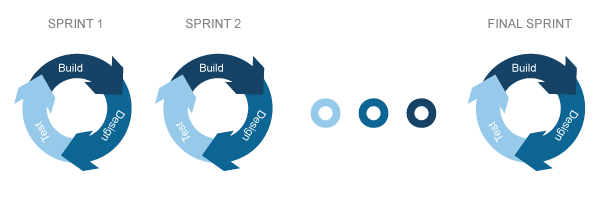What is Agile Software Development?
I am sure that most seasoned developers will be very familiar with Agile software development, but for those of you just starting out, this may be an unfamiliar practice. Since it's inception in circa 2001, Agile has grown to be one of the most popular methodologies for developing software, so it is important for aspiring developers like myself to understand it.
So what is Agile Software Development? Agile Software Development is an umbrella term for a number of methodologies that encourage flexbility and rapid responses to evolving requirements. This is achieved through:
- Incremental, evolving software - agile methods split development into short iterations, or "sprints", that typically last from 1-4 weeks. This reduces the need for up-front planning and design, and the aim is to have a new feature or working product ready at the end of each sprint.
- Self-organising and cross-functional teams - often one agile team will cover planning, analysis, design, coding, and testing. This ensures that the entire team is aware of the bigger picture and how everything fits together.
- Effective communication - a common practice in agile software development is the daily "scrum" (or stand-up). This involves team members sharing what they have been working on, what they plan on working on, and any issues they may have encountered. The benefit of this is that solutions can be found quickly to any roadblocks that are encountered, and that everyone is kept up-to-date on the status of the sprint.
Agile vs Waterfall
The other prominent software development methodology is the Waterfall method. This typically involves a linear set of phases that each progress one after another, and are reliant on the previous phase being completed. As you can imagine, this does not offer as much flexbility as Agile, as each phase involves the completion of big tasks such as implementation or testing, and often requirements do change frequently during the production process, resulting in a lot of re-work and wasted resources.
Summary
In conclusion, Agile is a proven and effective software development methodology that favors small, efficient and flexible teams, working on products with ever-changing and evolving requirements.
However, some larger scale organizations have found that Agile Software Development simply is not effective for their own dev teams for a number of reasons, so adopt a kind of hybrid approach, that mixes elements of both Agile and rigid plan-driven practices like the Waterfall method.
Regardless, it is clear that Agile Software Development has an important place in the tech sphere, and will be around for many years to come.




Top comments (0)